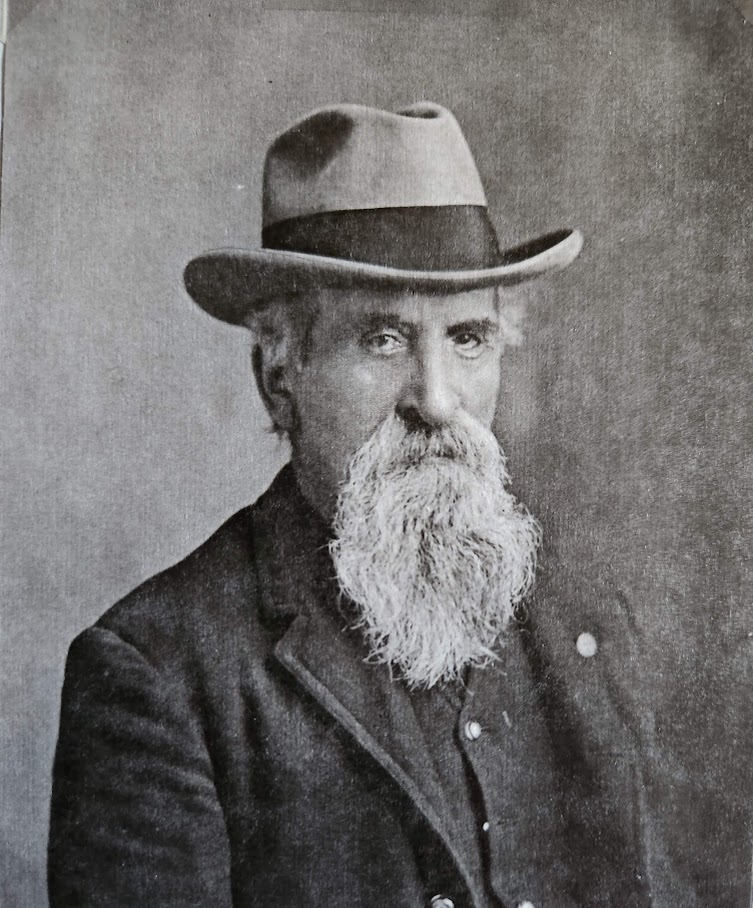
2) Octavo Barker (1827-1922)
Octavo Barker disliked his first named enough that he called himself “Bob”. Bob was 6th generation of this Barker family in North America and, my mother’s grandfather. He was born and raised on “Barker Hill” in the State of Maine, where 14 families of Barkers had settled. As a youth, Bob went to Boston and got a bit of legal training with a lawyer relative. Rail roads had become of great advantage for travel, of great economic interest and adventure, so Bob, as he said, “Went west, bossing a gang of Irishmen building a railroad to the Mississippi River”. At that time transport for the area, was mostly by hundreds of riverboats, working up and down the many rivers. So, Bob became a riverboat pilot. Pilots took over compete command from the captain, so that was full responsibility for the welfare of boat, passengers, and cargo. The pilots were well paid, highly respected men, on boat and ashore.
During his time on the Mississippi, Bob met an attractive young French lady named, Celina Trudeau, who, as my mother proudly, said was “One of the important Trudeau family of Missouri, and had a strict, convent education.” They soon were wed and settled, still on the river, in the wild community of Wabasha. The area was once the territory of the great Sioux Chief, Wabasha, and still subject to the unrest of the natives. There they started to raise a family. My grandmother told stories of mothers and young children hiding in the woods when there was threat of Indian raids, while the men stayed behind to defend the home.
Then the American Civil War began, Bob was one of the earlier men to offer his services, to help the North save the Union. Misfortune resulted and he along with some other survivors of a failed battle, became prisoners of the South and were sent to that terrible Andersonville Prison. There it became so overcrowded they were put in a yard outdoors, without any shelter, no more clothing other than what they came with, contaminated stream water to drink, and practically no food. What was given was only bad or spoiled food, unwanted by the South’s starving fighters, who had little enough to feed themselves. There was no chance of escape because it was well guarded by soldiers who had orders to shoot anybody who tried to cross, what the prisoners named “the dead line”. It got so bad that some men purposely walked across that line to be put out of their misery. Bob was a big person of -strong constitution and mind, determined to live and even persuaded a friend not to end his life by crossing the dead line. The war finally ended and both men were released and remained friends long thereafter. Some claim that more men died in that prison, than were killed in actual combat.
Bob returned to his family in Wabasha, but found things quite changed. Steam-boating on the river was being taken over by the railways and no longer could he be a pilot on the river, nor a “gentleman” landowner at Wabasha. It was time to find a new adventure. He chose to go further west and take up land that was opening up, (at a place that became Argyle, Minnesota) for homesteads and to have try at farming. After all he had started life with his first paying job on his father’s farm on “Barker Hill”. It paid him 25 cents for getting up early to wake the men who worked on the farm.
It was not long before Bob got himself elected as Justice of the Peace for his community. No doubt, his bit of experience with legal matters, a long time past, was a factor. For the next 25 years, he was known as “Judge Bob Barker”. I acquired a copy of Judge Barker’s book of his account of his many cases. It makes interesting reading. Cases range from people speeding “with horse and buggy”, to women not making payment for a sewing machine bought from a neighbor, to men beating their wives and on up to murder.
It was at Argyle that my mother was taken into her grandparents’ home to be raised, when her own single mother went out to work elsewhere. That is why I and my siblings got so many stories about this most interesting man, who my mother, dearly love and admired. Judge Barker finally retired and went to live with his son in Oregon, making occasional trips to visit his favorite people in Saskatchewan, my Grandma Susie Strachan, born Barker; and her daughter, my Mother, Grace Elizabeth, born Attix. The Barkers were dominant people in Mother’s life and largely responsible for her becoming a teacher. With that background, she was determined to see her own children get as much education as possible, even through difficult times and to become responsible adults and to care for ourselves and others.

thanks for the storys every one has a story ; it takes a motivated person to our histoy alive .Thank again